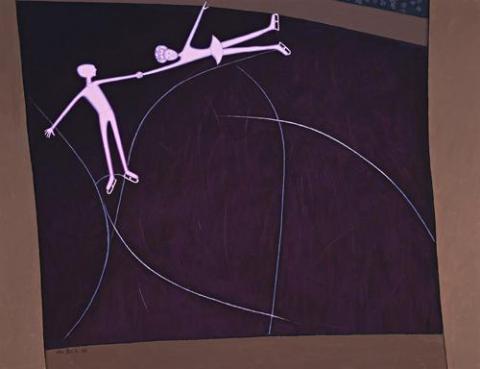UP IN THE AIR (SMALL VERSION), 1973
John Brack
oil on canvas
89.0 x 116.0 cm
signed and dated lower left: John Brack 1973
inscribed with title verso: Up in the Air
Private collection, Melbourne
John Brack, Rudy Komon Art Gallery, Sydney, 10-28 November 1973, cat.13 (label attached verso)
John Brack: Recent Paintings, Joseph Brown Gallery, Melbourne, 24 February – 11 March 1975, cat.6 (illus.)
John Brack: Selected Paintings 1947-1977, RMIT Gallery, Melbourne, 15 March – 1 April 1977
John Brack: Paintings and Drawings 1945-1977. Retrospective Exhibition, Australian National University, Melville Hall, Canberra, 21 September – 16 October 1977 (illus. exhibition catalogue)
Grishin, vol. II, o205, pp.28 & 148 (illus.)
Lindsay, R., John Brack: A Retrospective Exhibition, National Gallery of Victoria, Melbourne, 1987, p.127
Study for'Up in the Air' 1973, conté, 50.0 x 68.0 cm, University of Western Australia
Up in the Air (Large version), 1973, oil on canvas, 114.3 x 146.0cm, private collection, in Grishin, vol. II, o206, p.148 (illus.)
In Up in the Air (Small version), 1973, John Brack captures his skaters in an eye-catching but risky move. The painting, however, is much more than mere transcript, abounding with social comment and metaphor. In his earlier skating paintings such as Adagio, 1967, Brack admitted that he had first 'wanted to make a statement about romantic love...', but he had been unable to do so, his sensibilities lying in a far different direction.1 Combining the artificial with the theatrical, he worked through the ballroom dancing series and the contortions of the gymnasts before returning to his ice-skaters with different ideas and intentions. In both versions of Up in the Air and Finale, the figures are faceless, losing their individuality and identity as they become increasingly 'abstract' forms within the composition. Figures no longer dominate their settings, small on the rink symbolic of life, of ice thick or thin on which we skate and leave our marks. Nevertheless, the choreography of skating appealed to him, as did the movements of the ballroom dancers; but he scrutinised and recorded them with a coolly intellectual mind. Ever with an eye for the artificial and the put up façade, he admitted to being 'fascinated by the idea of people who turned pleasure, pastime, into work, labour...'.2 Although he was speaking about ballroom dancing, it could be applied equally to gymnastics and ice-skating, the latter with the added edge of greater risk taking. And herein lies the metaphorical references and satire. The surfaces of the ice rink are slippery and full of hidden dangers, a metaphor of the uncertainties of life and how we handle them. Of Up in the Air and the gymnast Three Pairs, Robert Lindsay wrote, 'Here an added social metaphor exists in the concept of balance, with the protagonists maintaining equilibrium within the contorting complexities of life.3 When Up in the Air (Small version) was exhibited in Brack's solo show at Rudy Komon's, John Henshaw referred to Brack's return to 'the gymnasium and the ice palace', observing that:
'...Brack's tubular manikins balance on bars or cavort on skates, grinning exemplars of physical fulfilment, emotional and intellectual under-development. The paint is applied with craftsmanship and the designs carefully worked out in chalk as preparations for painting. Visual puns, for instance, in the reflected legs of boy and girl ice-skating, have humorous and ironic overtones. The artist's capacity to use a static mode of composition full of subtlety to suggest oblique comment on the social scene places him in a rare context.'4
1. Hawken, N., 'The creators', Herald, Melbourne, 13 May 1967, p.25, quoted in Grishin, op.cit, vol.I, p.106
2. John Brack on John Brack, lecture, Canberra, 1977, quoted in Grishin, op.cit, p.106
3. Lindsay, op.cit, p.19
4. Henshaw, J., 'Art', Sun, Sydney, 14 November 1973, quoted in Lindsay, op.cit, p.128
DAVID THOMAS
